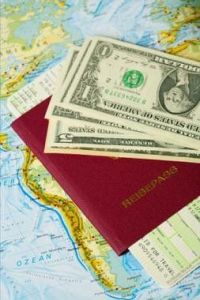Abroad and broke?
Posted by: kirsty_wilson in Travel General, tags: Budget Travel, Money, Travel Tips Running out of money while abroad is every traveler’s worst nightmare. The situation can be horrible enough to put a dampener on even the best laid plans.
Running out of money while abroad is every traveler’s worst nightmare. The situation can be horrible enough to put a dampener on even the best laid plans.
In order to avoid running through all the cash set aside for a trip in a few days, it is advisable for travelers to draft a realistic budget. This budget will enable an individual to have an idea of how much cash to set aside for the trip, keep track of expenses and to choose the most cost-effective means of travel, food and accommodation. A travel budget makes it easy to regulate spending and allows individuals to make the most of the cash they worked so hard to save.
Running out of money
Several situations can result in a loss of funds whilst abroad. The most common include being robbed of all cash, ATM cards and other documents, overspending on food, accommodation or travel costs, local exchange rates that are higher than expected, ATM failure and medical emergencies while traveling.
Although being abroad without funds presents a difficult dilemma and can be downright debilitating, it does not necessarily mean that a trip has to be terminated. The most important thing for vacationers to do is to keep their wits. Though dire, the situation does have solutions.
There are various ways in which individuals can get cash back into their pockets when they find themselves broke in a foreign country. Being aware of the potential solutions would make it easier and less stressful to deal with the scenario, should it arise.
How to survive
The first step is for the individual to analyze the situation with a clear and open mind. Being broke abroad can mean one of two things: that the person has completely exhausted all funds that they had or that they have sufficient funds but lack access to them.
Solving these two problems requires slightly different approaches:
- Seeking temporary local work
This solution is ideal if the traveler is completely broke and has no reserve cash. No matter how remote or foreign a place is there is usually some opportunities to earn money for those who find themselves broke. For instance, such individuals can earn money through bartending, washing dishes, serving or busking on the streets. Some can even earn decent cash by teaching English as a foreign language.
- Cash transfers
Another solution to salvaging a doomed trip is by receiving a cash transfer. This is a viable option for those who have temporarily lost access to their cash. Nowadays there are a variety of firms, such as Trans-fast, offering reliable, secure and fast money transfer services. The travelers can ask their friends or relatives back home to transfer money to them. They can then pick up the remittance in cash or they can have the funds transferred directly into their bank accounts.
If all else fails, vacationers still have the option of asking their local embassies for help. Most embassies can loan money to their nationals abroad to cover the costs of getting back home.

 Here, we consider several simple things you can do to make sure that your holiday isn’t ruined by financial worries.
Here, we consider several simple things you can do to make sure that your holiday isn’t ruined by financial worries.
 The first thing that will save your life/get you out of trouble/prevent you from losing wads of your well-saved money is – common sense! If things sound dangerous, they generally are. If things sound risky, they generally are. If things sound too good to be true, nine-tenths of the time, they generally are! Scams don’t just happen in Asia, but all over the world. In Asia, scammers generally target tourists as they are often viewed as easy targets. Many scams involve gaining the trust of the potential victim, so if a fairly random person begins to act super nice to you – remember that no one is invulnerable to scammers, especially you.
The first thing that will save your life/get you out of trouble/prevent you from losing wads of your well-saved money is – common sense! If things sound dangerous, they generally are. If things sound risky, they generally are. If things sound too good to be true, nine-tenths of the time, they generally are! Scams don’t just happen in Asia, but all over the world. In Asia, scammers generally target tourists as they are often viewed as easy targets. Many scams involve gaining the trust of the potential victim, so if a fairly random person begins to act super nice to you – remember that no one is invulnerable to scammers, especially you.
 Entries (RSS)
Entries (RSS)